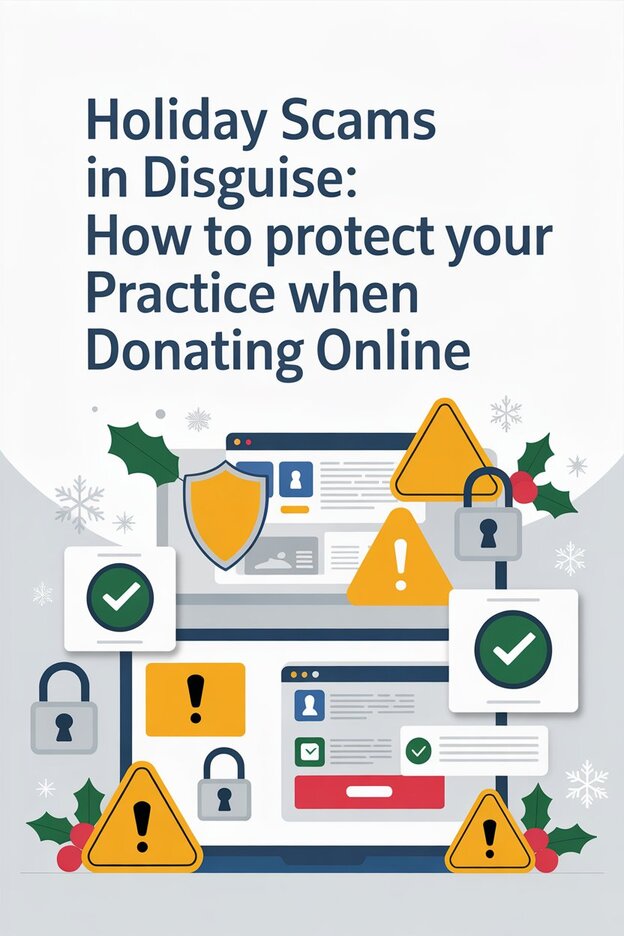 The holidays bring out the best in people — and, unfortunately, the worst in scammers.
The holidays bring out the best in people — and, unfortunately, the worst in scammers.
Between charity drives, GoFundMe campaigns, and end-of-year giving, cybercriminals know this is when businesses and professionals open their wallets and their hearts. But one wrong click or unvetted fundraiser can do more than waste money — it can damage your reputation, violate compliance policies, and erode the community trust you’ve worked so hard to earn.
In 2024, the Federal Trade Commission uncovered a massive telefunding scheme that made over 1.3 billion deceptive calls, stealing $110 million from donors. Meanwhile, researchers at Cornell University found 800+ fake fundraising accounts operating across social media platforms like Facebook and Instagram.
Even smart, well-intentioned people get caught off guard. Here’s how to make sure your giving stays safe, secure, and genuine this season.
1️⃣ How to Vet a Fundraiser Before You Donate
A legitimate campaign should clearly answer:
- Who’s organizing the fundraiser — and their connection to the recipient
- How the funds will be used and over what timeline
- Who controls withdrawals and how funds reach their destination
- Whether close contacts publicly support the campaign
If any of these answers are missing or vague, pause.
A legitimate fundraiser welcomes questions; a scammer avoids them.
2️⃣ Red Flags That Scream “Scam”
Before your business donates, look for these warning signs:
🚩 False or exaggerated information on the donation page
🚩 Fund withdrawals that don’t match the stated purpose
🚩 Copycat fundraisers impersonating real people or charities
🚩 Overly emotional, “too perfect” stories meant to push urgency
If you see multiple red flags, report it — and move on.
3️⃣ How to Check Legitimate Charities
Even established nonprofits can have shady practices. Before writing a check:
- Look for transparent financial reports and program descriptions
- Review how much of each dollar goes to programs vs. admin overhead
- Search the charity’s name with keywords like “fraud” or “complaints”
- Verify registration through trusted sites like CharityNavigator.org, BBB Wise Giving Alliance, or GuideStar.org
If you can’t find this information, that’s your sign to hold off.
4️⃣ Common Tactics Charity Scammers Use
Scammers are masters of emotional pressure. Their favorite tricks include:
- Asking for gift cards, wire transfers, or crypto (legit charities accept credit cards or checks)
- Sending links to sites that lack “https” (no “s” = no secure connection)
- Creating false urgency: “Donate today or the match disappears!”
- Pretending you’ve already pledged and just need to “confirm”
No real charity will rush or guilt you. Generosity and pressure should never go hand in hand.
5️⃣ Why This Matters for Your Business
If your healthcare, financial, or legal practice donates publicly — or even through an employee initiative — your generosity becomes part of your brand story.
A single donation to a fraudulent campaign can backfire, connecting your firm’s name to a scam. Even worse, the same tactics used in charity fraud — urgency, impersonation, and spoofed websites — are identical to those used in phishing and invoice fraud attacks.
In other words: teaching your team how to spot fake fundraisers is also training them to avoid cyber threats.
6️⃣ How to Protect Your Business and Your Goodwill
🛡 Set a donation policy: Define who approves donations and where they can go.
🧠 Educate your team: Train staff to double-check links and verify campaigns before giving under your business name.
🔒 Use trusted channels: Always donate directly through official charity websites — never via random links or DMs.
🔍 Be transparent: If you promote donations publicly, confirm the legitimacy of every partner organization.
📊 Monitor impact: After donating, follow up — many charities publish reports on how contributions are used.
Keep Your Holidays Generous — Not Risky
Generosity is one of your business’s best qualities. Don’t let scammers use it against you.
A few extra minutes of due diligence can protect your reputation, your finances, and your peace of mind.
If you’d like your team trained to spot holiday charity scams, phishing attempts, or fake payment requests, we can help.
👉 Schedule a free discovery call — and make sure your goodwill goes where it’s meant to.
Because the best gift your business can give this holiday season is trust that can’t be stolen.


